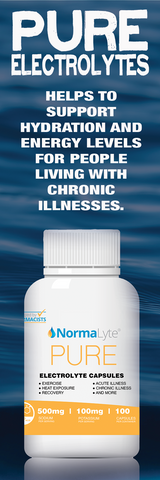Navigating Life After a Dysautonomia Diagnosis


Receiving a diagnosis of dysautonomia can be an overwhelming whirlwind of emotions and uncertainties. You find yourself grappling with symptoms and adjusting to a new way of life. It can be scary, but it's essential to remember that you are not alone.
What is Dysautonomia?
Dysautonomia is an umbrella term for various conditions that involve dysregulation of the autonomic nervous system, which controls involuntary bodily functions such as heart rate, blood pressure, digestion, and temperature regulation. Some common forms of dysautonomia include:
-
Postural Orthostatic Tachycardia Syndrome (POTS): Characterized by an abnormal increase in heart rate upon standing, accompanied by symptoms like dizziness, lightheadedness, fatigue, and fainting.
-
Neurocardiogenic Syncope (NCS): Also known as vasovagal syncope, it involves sudden drops in heart rate and blood pressure, leading to fainting or near-fainting episodes, often triggered by emotional stress or standing for prolonged periods.
-
Multiple System Atrophy (MSA): A progressive neurodegenerative disorder that affects multiple systems in the body, including the autonomic nervous system, leading to symptoms such as orthostatic hypotension, motor dysfunction, and impaired bladder control.
-
Pure Autonomic Failure (PAF): Characterized by dysfunction of the autonomic nervous system without involvement of other neurological symptoms, leading to orthostatic hypotension and related symptoms.
-
Familial Dysautonomia (FD): Also known as Riley-Day syndrome, it is a genetic disorder affecting the autonomic nervous system, leading to symptoms such as poor temperature regulation, difficulty swallowing, gastrointestinal issues, and orthostatic hypotension.
-
Autoimmune Autonomic Ganglionopathy (AAG): An autoimmune disorder where the immune system attacks the autonomic ganglia, disrupting autonomic function and leading to symptoms such as orthostatic hypotension, gastrointestinal issues, and urinary retention.
-
Chronic Fatigue Syndrome (CFS): While not strictly categorized as dysautonomia, CFS often involves dysregulation of the autonomic nervous system, leading to symptoms such as fatigue, cognitive difficulties, and orthostatic intolerance.
Always Advocate for Yourself
One of the most important lessons to learn after a dysautonomia diagnosis is the power of self-advocacy. Don't be afraid to speak up and ask questions during doctor's appointments. Educate yourself about dysautonomia and your specific condition, and be proactive in seeking the care and support you need. Remember, you are the expert on your own body, and your voice matters.
Find Doctors Who Will Help
Finding the right medical team is crucial in managing dysautonomia. Seek out healthcare providers who are knowledgeable about dysautonomia and are willing to work with you to develop a comprehensive treatment plan. Don't hesitate to seek second opinions if needed, and prioritize doctors who listen to your concerns and respect your input.
A great place to start looking for doctors in the dysautonomia field is by looking at Dysautonomia International's website. They provide resources there that can help you find a starting point.
Track Symptoms
Dysautonomia can often be accompanied by brain fog, making it challenging to remember important details or track symptoms accurately. A great way to track your symptoms is by using an app! Guava has partnered with NormaLyte and has made a commitment to people with POTS. Plus, it's free to download and use! Download it here.
Not tech savvy? Consider Investing in a journal or notebook.
Embrace Spoon Theory: Live It
Spoon theory is a metaphor used to explain the limited energy reserves that individuals with chronic illnesses, including dysautonomia, must manage each day. Understanding and embracing spoon theory can help you prioritize tasks, conserve energy, and avoid overexertion. Remember, every activity, no matter how small, requires a spoon, so use them wisely and pace yourself accordingly.
Listen to Your Body
Learning to listen to your body is essential when living with dysautonomia. Pay attention to warning signs of overexertion or exacerbation of symptoms, and don't ignore them. It's okay to say no to activities or commitments that drain your energy reserves, and prioritizing self-care is paramount. Remember, your health and well-being should always come first.
Sleep Can Be Hard to Come By


Sleep disturbances are common in dysautonomia, making it challenging to get the restorative sleep your body needs. Establishing a bedtime routine, creating a comfortable sleep environment, and practicing relaxation techniques can help improve sleep quality.
If sleep difficulties persist, don't hesitate to discuss them with your healthcare provider, as they may be able to recommend strategies or treatments to help.
Stay Strong, Even on Hard Days
Living with dysautonomia can be challenging, and there will undoubtedly be difficult days along the way. During these times, it's essential to stay strong and remember that you are resilient. Reach out to friends, family, or support groups for encouragement and understanding, and don't hesitate to ask for help when you need it. Remember, you are capable of overcoming obstacles and thriving despite the challenges you may face.
Use Oral Rehydration Salts like NormaLyte
Maintaining hydration and electrolyte balance is crucial in managing dysautonomia symptoms, particularly during periods of increased activity or in hot weather. Oral rehydration salts like NormaLyte can help replenish electrolytes lost through sweating and prevent dehydration. Incorporating NormaLyte into your daily routine can help support your overall health and well-being.Remember, you are not defined by your diagnosis, and with time and perseverance, you can thrive despite the challenges you may face.








Leave a comment